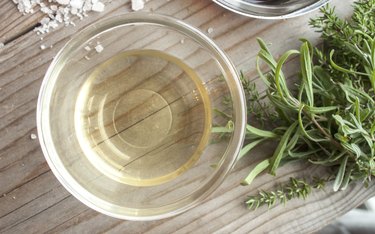
Vinegar is a popular ingredient used worldwide. In moderation, it's delicious, but too much vinegar can result in a sour, bitter flavor. It's hard to neutralize vinegar's taste once it's become unpleasant, but certain common ingredients can help you counteract its overpowering flavor.
Vinegar Uses and Benefits
Video of the Day
Many types of vinegars are made and consumed around the world. Although you might be most familiar with vinegars like balsamic vinegar, white vinegar and malt vinegar, many other vinegars are also popularly consumed.
Video of the Day
Apple cider vinegar, wine vinegar, cider vinegar and rice vinegars are also commonly produced. You might even find vinegars like coconut vinegar, palm vinegar, honey vinegar and sugar cane vinegar in stores.
According to a November 2012 article in the [Beverage and Food World Journal](https://www.researchgate.net/publication/280722745_Vinegar_Production_Technology-An_Overview), vinegar has been produced and used for thousands of years. This fermented ingredient has been used to preserve and flavor foods and is even thought to have medicinal purposes.
Although vinegars don't tend to have much in the way of essential nutrients, a May 2014 review in the Journal of Food Science reported that vinegar products have antioxidant and antimicrobial activity. Vinegar might even be able to benefit your health by helping lower your cholesterol, blood sugar and blood pressure.
The benefits of vinegar can vary from product to product. According to an April 2017 article in the Food Chemistry Journal, this is because of the various micronutrients and bioactive compounds that are found in different types of vinegars. Similarly, these vinegars have their own particular colors and flavor profiles.
If you're concerned about vinegar's bitter flavor, you should start by considering the type of vinegar you're using. Certain types of vinegar, like rice vinegar, tend to have a mild flavor that's almost sweet. In contrast, distilled white vinegar has a distinct sharpness and can easily make a dish bitter if you accidentally add too much vinegar.
How to Neutralize Vinegar's Taste
Neutralizing vinegar's taste can be a real challenge. This flavor is due to this ingredient's acetic acid content. However, the exact percentage of acetic acid in each vinegar differs. This means that it's usually easy to neutralize the vinegar taste of mild vinegars, and extremely challenging to neutralize the flavor of highly acidic products.
If you're trying to neutralize vinegar's taste and are making a sauce, you may want to try and add more of other ingredients. For instance, a potsticker dipping sauce made of soy sauce, too much vinegar and chili may simply need larger proportions of soy and chili added. You may even want to add a drop of honey or a pinch of sugar, which would result in a sweet-and-sour sauce.
Similarly, if you added too much vinegar to a salad dressing, you can try adding more oil to balance out the mixture. You can also try integrating sweeter components, like aged balsamic vinegar.
Dishes that have utilized vinegar in other ways tend to be more challenging. This is particularly the case if you use a popular vinegar, like apple cider vinegar, for the wrong purpose.
Apple cider vinegar is suitable for a wide variety of recipes, since this is a medium-flavored vinegar. However, it's not appropriate for every food, particularly not for something like curing fish overnight.
If you've added apple cider vinegar to a ceviche, you'll find that this vinegar has a very strong flavor that makes the whole dish bitter. To neutralize the vinegar's taste in this case, you'd need something very alkaline to counteract the acidity.
Mixing in a sprinkle of common alkaline ingredients, like baking soda or baking powder, can often salvage a dish. If this still hasn't done the trick, adding neutral flavors, like sour cream or yogurt, can also help balance out the flavors.